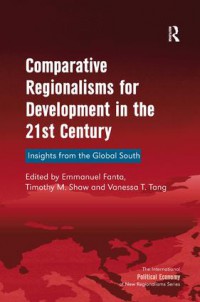Introduction: Comparative Regionalisms for Development in the 21st Century: Insights from the Global South

The global 'financial' crisis at the turn of the decade has accelerated changes in the relative standing of major regions. As both the US and Eurozone economies have confronted a series of setbacks and struggles to find their second breath, so Asia, Latin America and even Africa have picked up the slack and have been able to maintain high levels of growth. The resilience of the Global South questions whether we are witnessing an evolution towards a regional rebalancing or even global restructuring. This responding volume has four interrelated topics. It explores the transformation taking place in/with regard to the financing of development in the Global South and the apparition of new players in the field. The emergence of 'New Regionalisms' in the South and the usefulness of these experiences for comparative studies of regional relationship is explicated. It turns its attention to new forms of transnational governance that are emerging and the role that a novelty of actors play in this 'new multilateralism'. Finally, it looks into the implications of this trio of novel directions and players for analyses and policies.
